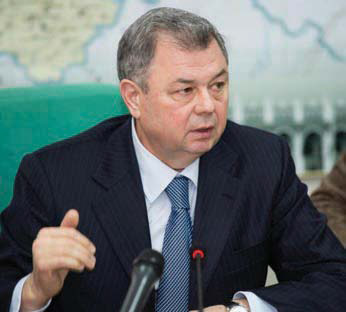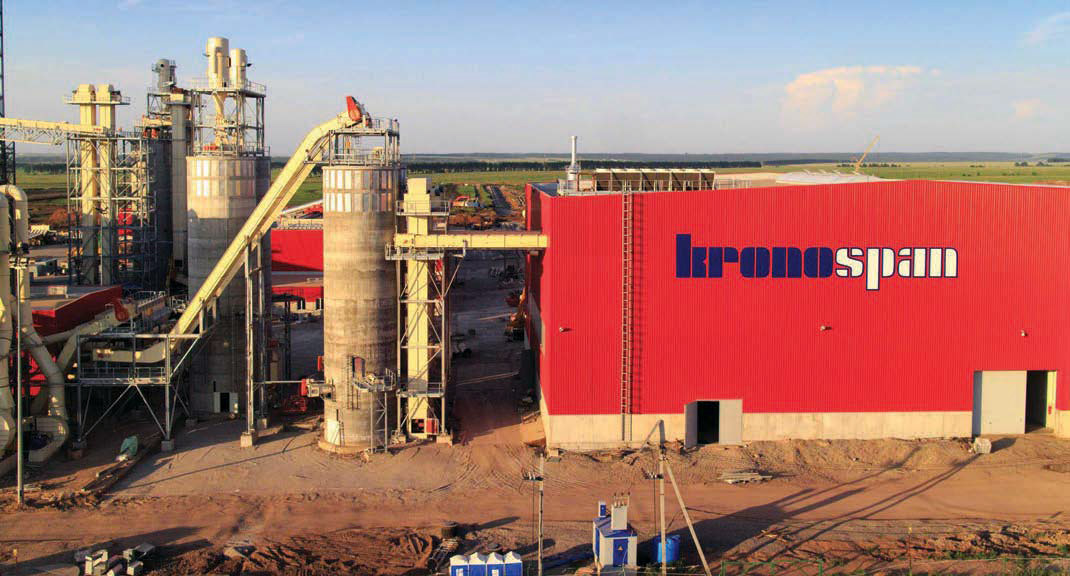Kronospan has big ambitions in Russia
27 June 2018Kronospan has big plans for business in Russia, including creating one of the largest particleboard plants in eastern Europe and a new MDF mill. Eugene Gerden reports
Kronospan plans to significantly accelerate its Russian expansion this year through the launch of new investment projects and completion of existing ones, according to the company and representatives of the Russian federal government, which oversees the development of the panel industry in the country.
As part of these plans, Kronospan intends to complete the expansion of its existing particleboard plant, which is located in the city of Ufa in the Bashkortostan Republic, the most populous republic in Russia, which is located between the Volga River and the Ural mountains.
Currently the plant’s monthly capacity is estimated at 55,000-60,000m3; however, Kronospan is ready to boost it significantly. It hopes the plant will reach its design capacity of 90,000m3/month (more than one million m3/year) in the coming months, making it one of the largest facilities of its kind in Russia and the whole of eastern Europe.
According to Sergei Straukh, a senior production manager at the Ufa factory, the plant consumes about 90,000m3 of raw materials a month, while the quality of the products does not depend on the source material.
The factory’s commercial director, Jan Barysh, said that 40% of the plant’s current output is exported to China and Central Asian states, including Kazakhstan, Uzbekistan and Tajikistan. A significant proportion also goes to cities neighbouring Ufa, such as Yekaterinburg and Izhevsk, which have a well-established furniture industry. The expansion of the factory will enable Kronospan to boost exports of its finished products, including to newer markets in the Asia-Pacific states as well as western markets.
The investment made in doubling the factory’s capacity is estimated at €200m – not that much more than the original plant’s price tag of €250m. Kronospan also has plans to build a third line at the plant, which will specialise in the production of higher-grade materials. Work is expected to start on this by the end of this year.
However, implementation of these plans will depend on resolution of all the legal issues with local ecologists.
Currently, Kronospan continues to do battle with local environmentalists who insist the plant should close because, they allege, it produces harmful emissions and its waste treatment facilities do not comply with Russian ecological requirements.
In their petitions and lawsuits to the Russian federal courts, the protesters say that the Kronospan plant is equipped with the same equipment that was installed in the Sonae particleboard factory in Liverpool in 2011 and which was the cause of a fire at the UK factory.
The Sonae factory was closed in 2012 and the equipment sold to Kronospan.
Ufa is not the only region that will become a base for Kronospan’s further expansion in Russia. The company is currently considering building a new MDF plant in Kaluga, a region in Central Russia, close to Moscow. The new plant will mainly focus on the domestic market.
Kronospan’s plans have been confirmed by the press service of the authorities of the Kaluga region. An agreement for the building of the plant was initially signed between Anatoly Artamonov, the governor of the Kaluga region, and Kronospan, several months ago during Mr Artamonov’s visit to Germany. Implementation of the project, however, was suspended until now.
The new plant will be built within the territory of the Lyudinovsky district of the Kaluga region and will have the capacity to produce 350,000m3 of MDF per year.
The plant will also produce HDF and LMDF boards, coated with special decorative laminated film.
The initial investment is estimated at about 17.54 billion rubles (US$305m). The new plant will create more than 200 jobs.
It is reported that the Kaluga region has favourable conditions for the implementation of such projects, being one of the most forested regions in Central Russia.
Finally, Kronospan is considering building a wood processing plant in the Novosibirsk region, making an investment of around €330m. This has been confirmed recently by Alexander Zyryanov, director general of the Investment Development Agency of the Novosibirsk region, a state agency responsible for attracting investment in the region.
“The company is ready to start the construction of the plant this year, with the planned commissioning by 2020,” said Mr Zyryanov. “The processing capacity of the plant will be five million m3 of wood a year. It is expected that the plant will produce particleboard and some other types of boards, as well as final products from them, for example laminate.”
Kronospan considers the Novosibirsk region as a favourable location for the new plant because of the large volumes of raw materials available, stable demand and good logistics. In addition, the region is considered one of the most well-developed in Russian Siberia, which is located not far from China.
Overall, according to statements from Nikolai Tsukanov, the governor of the Kaliningrad region, Kronospan plants to invest more than €600m in the development of its Russian enterprises and assets this year.
The company has been operating in Russia since 2003. Its first investment was in a plant for the production of boards for laminated flooring in the city of Yegoryevsk (Moscow region). Since then it has invested US$2bn in the development of its Russian business.
In recent years Kronospan and some other global majors operating in Russia have started to pay more attention to MDF production.
In terms of potential growth, the MDF sector remains the most promising wood based panel in Russia. According to data from the Russian Federal State Statistics Service (Rosstat), Russia’s current MDF output is estimated at two million m3/ year and there is the possibility that it will continue to grow in the coming years as new facilities come on stream.
Russia’s minister of industry and trade, Denis Manturov, believes the Russian wood based panel industry will continue its active development next year. It will be dominated by production facilities with high unit capacity and the majority of production lines will be equipped with continuous presses.
According to analysts at the Ministry of Industry and Trade, Russia’s wood based panels market has declined by about 30% over the last two years, mainly because of the stagnation of the domestic furniture industry, the main consumer of panels in Russia. The industry’s value fell from US$9.6bn in 2012 to about US$5.2bn in 2017.
However, official statistics show that production is on the rise again. According to data from the Russian Federal State Statistics Service (Rosstat), total production of panels (MDF, particleboard and OSB) in Russia last year amounted to about six million m3 – about 15% higher than in 2016.
Statistics for the current year are not yet available. However, according to a Rosstat spokesperson, production continues to increase and 2018 volumes could be 22-25% higher than in 2017.
This trend is reflected in the resumption of many investment projects which had been suspended because of the economic crisis in Russia.

